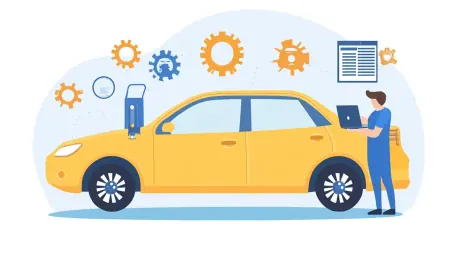The DevOps Automotive Services market is poised for significant growth over the coming decade, driven by continuous advances in technology, strategic business investments, and evolving consumer demands. This article delves into the key trends, growth drivers, and challenges that are shaping the future of this dynamic sector, offering a comprehensive forecast up to 2032.
Market Segmentation and Service Types
Consulting Services
Consulting services in the DevOps Automotive sector are essential for guiding companies through the complexities of adopting and integrating DevOps practices. These services play a critical role in advising organizations on how to streamline their development processes, enhance productivity, and reduce the time-to-market for new products. As automotive companies increasingly recognize the benefits of adopting DevOps methodologies, the demand for expert guidance is expected to rise significantly. Consultants are also invaluable in helping organizations navigate the cultural shifts that DevOps adoption often necessitates, ensuring a smoother transition and higher levels of acceptance within teams.
Moreover, consulting services are pivotal in tailoring DevOps implementation strategies to meet the specific needs and goals of each automotive company. This customization ensures that the unique challenges and opportunities within the automotive sector are addressed effectively. By leveraging the expertise of consulting services, companies can achieve a more seamless integration of DevOps practices, leading to enhanced innovation and a stronger competitive edge in the market.
Implementation and Integration Services
Implementation and integration services are vital for the successful deployment of DevOps practices within automotive companies. These services ensure that all components of the DevOps pipeline, including continuous integration and continuous delivery (CI/CD), automated testing, and monitoring, work seamlessly together. The growing complexity of automotive software systems necessitates robust implementation and integration services to maintain efficiency and reliability. As automotive companies increasingly develop software-driven features, the demand for these services is expected to grow.
Additionally, implementation and integration services help automotive companies to adopt advanced tools and technologies that are essential for effective DevOps practices. From selecting the right CI/CD tools to configuring automated testing frameworks, these services provide the technical expertise required to optimize the DevOps pipeline. Ensuring that all components of the DevOps pipeline are properly integrated is crucial for maintaining the quality and reliability of automotive software systems. As a result, companies are investing heavily in implementation and integration services to stay competitive in a rapidly evolving market.
Operation and Maintenance Services
Operation and maintenance services are essential for the ongoing success of DevOps initiatives in the automotive sector. These services encompass monitoring, troubleshooting, and optimizing DevOps processes to ensure they run smoothly and efficiently. As automotive companies increasingly rely on software-driven innovations, the need for reliable operation and maintenance services will continue to grow. These services help companies to quickly identify and resolve issues, minimizing downtime and ensuring the continuous delivery of high-quality software.
Furthermore, operation and maintenance services play a critical role in the ongoing improvement of DevOps practices. By monitoring performance metrics and analyzing data, these services can identify areas for optimization and implement changes that enhance the efficiency and effectiveness of DevOps processes. This continuous improvement is essential for keeping pace with evolving industry standards and customer expectations. As a result, automotive companies are placing a strong emphasis on operation and maintenance services to ensure the long-term success of their DevOps initiatives.
Geographic Segmentation and Regional Insights
North America
North America, particularly the United States, is a significant market for DevOps Automotive Services. The region’s advanced technological infrastructure and high adoption rate of innovative practices make it a fertile ground for DevOps growth. Companies in North America are investing heavily in DevOps to stay competitive and meet the rising consumer demand for advanced automotive technologies. The presence of major automotive manufacturers and tech companies in the region also contributes to the increasing adoption of DevOps practices.
In addition to technological infrastructure, the regulatory environment in North America supports the growth of the DevOps Automotive Services market. Policies that encourage innovation and investment in technology create a favorable landscape for companies looking to adopt DevOps. As a result, the region is expected to continue to be a leader in the adoption of DevOps practices.
Asia-Pacific
The Asia-Pacific region, including countries like Japan, China, and India, is experiencing rapid growth in the DevOps Automotive Services market. The region’s burgeoning automotive industry, coupled with increasing investments in technology, is driving the adoption of DevOps practices. As these countries continue to develop their technological capabilities, the demand for DevOps services is expected to surge. The region’s focus on becoming a global leader in automotive manufacturing and technological innovation further fuels this growth.
Governments in the Asia-Pacific region are also playing a crucial role in promoting the adoption of DevOps practices. Initiatives aimed at boosting manufacturing capabilities and technological advancements provide a supportive environment for companies looking to implement DevOps. As a result, the Asia-Pacific region presents significant growth opportunities for DevOps Automotive Services.
Europe
Europe is another key region for the DevOps Automotive Services market, with countries like Germany, the UK, and France leading the charge. The region’s strong automotive industry and focus on innovation make it a prime market for DevOps adoption. European companies are leveraging DevOps to enhance their production processes, improve product quality, and reduce time-to-market. The region’s emphasis on sustainability and compliance with stringent regulations also drives the need for efficient and reliable DevOps practices.
The European market is characterized by a high level of collaboration between automotive manufacturers, technology providers, and regulatory bodies. This collaborative approach fosters innovation and the development of best practices in DevOps. As a result, Europe continues to be a key player in the global DevOps Automotive Services market.
Competitive Landscape and Key Players
Market Leaders
The DevOps Automotive Services market is characterized by intense competition, with several key players vying for market share. Companies like Appinventiv, Intellias, Quema, IT Outposts, and A-DevOps Solutions are at the forefront of this competitive landscape. These market leaders are continually innovating and expanding their service offerings to stay ahead of the competition. By investing in research and development, these companies are able to introduce new and improved DevOps practices that address the evolving needs of the automotive industry.
In addition to innovation, market leaders are focused on building strong relationships with their clients. By providing exceptional service and support, these companies are able to retain their customer base and attract new clients. The emphasis on customer satisfaction and trust is a key differentiator in the highly competitive DevOps Automotive Services market.
Pricing Strategies
Pricing strategies play a crucial role in the competitive dynamics of the DevOps Automotive Services market. Companies are adopting various pricing models, including subscription-based services, pay-per-use, and customized pricing plans, to attract and retain customers. Understanding and adapting to market pricing trends is essential for companies to maintain their competitive edge. By offering flexible pricing options, companies can appeal to a broader range of clients, from large automotive manufacturers to smaller suppliers.
Furthermore, transparent and competitive pricing strategies can enhance customer trust and satisfaction. Companies that offer clear and reasonable pricing for their services are more likely to build long-term relationships with their clients. As the market continues to evolve, pricing strategies will remain a key factor in determining the success of companies in the DevOps Automotive Services market.
Growth Strategies
To achieve sustainable growth, companies in the DevOps Automotive Services market are employing various strategies, including mergers and acquisitions, strategic partnerships, and extensive R&D investments. These strategies enable companies to expand their service portfolios, enter new markets, and enhance their technological capabilities. By forming strategic partnerships with other industry leaders, companies can leverage each other’s strengths to create innovative solutions and provide comprehensive DevOps services.
Moreover, mergers and acquisitions allow companies to quickly scale their operations and gain access to new technologies and expertise. This approach enables companies to stay ahead of the competition and rapidly respond to changing market demands. Investing in research and development is also crucial for driving innovation and maintaining a competitive edge in the DevOps Automotive Services market.
Trends and Growth Factors
Technological Advancements
Technological advancements are a significant driver of growth in the DevOps Automotive Services market. Innovations in automation, artificial intelligence, and machine learning are transforming the way automotive companies develop and deploy software. These technologies enable more efficient DevOps processes, leading to faster development cycles and improved product quality. As companies continue to invest in advanced technologies, the adoption of DevOps practices is expected to increase further.
Additionally, the integration of IoT (Internet of Things) and connected vehicle technologies is creating new opportunities for DevOps in the automotive sector. These advancements require robust DevOps practices to manage the increased complexity and ensure the reliability and security of automotive software systems. The continuous evolution of technology will continue to drive the demand for DevOps services in the automotive industry.
Economic Growth and Investment
Economic growth, particularly in developing regions, is fueling the demand for DevOps Automotive Services. As countries like China, India, and Brazil continue to develop their economies, the automotive industry in these regions is expanding rapidly. Increased investment in technology and infrastructure is driving the adoption of DevOps practices, creating new opportunities for market growth. As these economies grow, consumer demand for advanced automotive technologies also increases, further boosting the need for DevOps services.
Additionally, government initiatives aimed at promoting manufacturing and technological innovation are supporting the growth of the DevOps Automotive Services market. By providing incentives and creating a favorable business environment, governments are encouraging companies to invest in DevOps practices. This support is crucial for driving the adoption of DevOps in developing regions and creating new growth opportunities for the market.
Consumer Demand
Rising consumer demand for advanced automotive technologies is another key growth factor for the DevOps Automotive Services market. Consumers are increasingly seeking vehicles with sophisticated software features, such as autonomous driving capabilities, advanced infotainment systems, and enhanced safety features. To meet these demands, automotive companies are turning to DevOps to accelerate their development processes and deliver high-quality products. The emphasis on customer satisfaction drives companies to continuously improve their DevOps practices and innovate new solutions.
Consumer preferences are also evolving, with a growing focus on sustainability and environmentally-friendly technologies. This shift in demand encourages automotive companies to adopt DevOps practices that promote efficiency and reduce waste. By staying attuned to consumer trends, companies can align their DevOps initiatives with market needs and drive continued growth.
Challenges and Regulatory Landscape
Regulatory Policies
Regulatory policies pose significant challenges to the DevOps Automotive Services market. Compliance with stringent regulations, particularly in regions like Europe and North America, can be complex and costly. Companies must navigate these regulatory landscapes carefully to avoid penalties and ensure their DevOps practices meet all legal requirements. Maintaining compliance with regulations related to data privacy, safety, and environmental standards is particularly challenging for automotive companies.
Despite these challenges, regulatory compliance also presents an opportunity for companies to differentiate themselves by demonstrating their commitment to high standards of quality and safety. By prioritizing compliance in their DevOps practices, companies can build trust with consumers and regulatory bodies, enhancing their reputation and competitiveness in the market.
Technological Challenges
The DevOps Automotive Services market is on the verge of substantial growth throughout the next decade, propelled by continuous technological innovations, strategic business investments, and shifting consumer expectations. With the rapid pace of technological advancements, automotive companies are increasingly adopting DevOps methodologies to enhance their operational efficiency and accelerate product delivery cycles.
Investment in new technologies, such as artificial intelligence and the Internet of Things, is becoming a cornerstone for companies eager to maintain a competitive edge. These investments not only streamline operations but also open new avenues for customer engagement. Moreover, as consumers demand more personalized and connected experiences, the integration of DevOps practices ensures that automotive companies can quickly respond to these evolving needs.
However, this growth trajectory is not without its hurdles. The sector faces challenges such as cybersecurity threats, regulatory compliance, and the need for continuous upskilling of the workforce to keep pace with technological changes. Addressing these challenges will require a coordinated effort from industry leaders, policymakers, and educational institutions.
This article explores these trends, growth drivers, and challenges in depth, providing a thorough outlook for the DevOps Automotive Services market through 2032. With a comprehensive forecast, stakeholders can gain valuable insights into what lies ahead, preparing them to navigate and capitalize on this dynamic sector’s future opportunities and obstacles.









